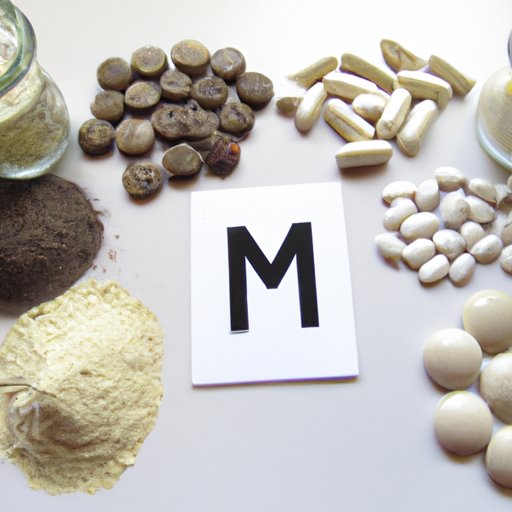Introduction
Minerals are essential components of a healthy diet, yet many people don’t understand what they are or why they are important. This article will explore minerals in food, how to identify them, the benefits of eating mineral-rich foods, the different types of minerals found in food, and tips for increasing your mineral intake.

Overview of Minerals in Food
Minerals are naturally occurring elements that are essential for normal body functioning. They are typically found in soil and water, and are absorbed by plants, which humans then consume. Minerals are found in a variety of foods, including vegetables, fruits, grains, dairy products, meats, and legumes. The type and amount of minerals in food can vary depending on the soil in which it was grown, as well as other environmental factors.
Common Misconceptions About Minerals in Food
Many people believe that processed and refined foods contain more minerals than fresh foods, but this is not the case. In fact, most processed and refined foods have fewer minerals than their unprocessed counterparts due to the processing and refining process. Additionally, some people mistakenly believe that vitamins and minerals are interchangeable, but this is not true. Vitamins and minerals are both important for good health, but they are not the same.

How to Identify Minerals in Food
The best way to identify minerals in food is to read the nutritional labels. These labels will tell you the amount of each mineral present in the food, as well as the percentage of the daily value (DV) for each mineral. It’s important to note that the DV is based on a 2,000 calorie per day diet. Other sources of information about minerals in food include websites such as the USDA National Nutrient Database, which provides detailed information about the nutrient content of various foods.
The Benefits of Eating Mineral-Rich Foods
Eating a diet rich in minerals has numerous health benefits. Minerals help to regulate many body functions, including muscle contraction, nerve transmission, blood clotting, and fluid balance. Eating mineral-rich foods can improve overall health, strengthen bones and teeth, and enhance energy levels. Deficiencies in certain minerals can lead to serious health problems, so it’s important to ensure that your diet includes enough mineral-rich foods.

The Different Types of Minerals Found in Food
Minerals can be divided into two categories: macronutrients and micronutrients. Macronutrients are minerals that the body needs in larger amounts, such as calcium, magnesium, potassium, and sodium. Micronutrients are minerals that the body needs in smaller amounts, such as iron, zinc, iodine, and selenium. Both macronutrients and micronutrients are essential for good health, and a balanced diet should include both types of minerals.
Tips for Increasing Your Intake of Minerals
There are several ways to increase your intake of minerals. Eating a variety of foods is one of the best ways to ensure that you are getting all of the necessary minerals. Choose foods that are naturally rich in minerals, such as dark leafy greens, nuts and seeds, whole grains, and legumes. Reading nutrition labels is also a helpful way to identify which foods are high in minerals. If you feel that your diet is lacking in minerals, you may want to consider taking a supplement.
Conclusion
Minerals are essential components of a healthy diet and play an important role in overall health. Eating a variety of foods and reading nutrition labels can help you identify which foods are high in minerals. Additionally, taking a supplement can help to ensure that you are getting enough minerals in your diet. By understanding the importance of minerals and how to increase your intake of them, you can ensure that you are getting all of the necessary nutrients for optimal health.
Call to Action
Take the time to learn more about minerals and how they can benefit your health. Start incorporating more mineral-rich foods into your diet and consider taking a supplement if needed. With a few simple changes, you can improve your overall health and wellbeing.
(Note: Is this article not meeting your expectations? Do you have knowledge or insights to share? Unlock new opportunities and expand your reach by joining our authors team. Click Registration to join us and share your expertise with our readers.)
